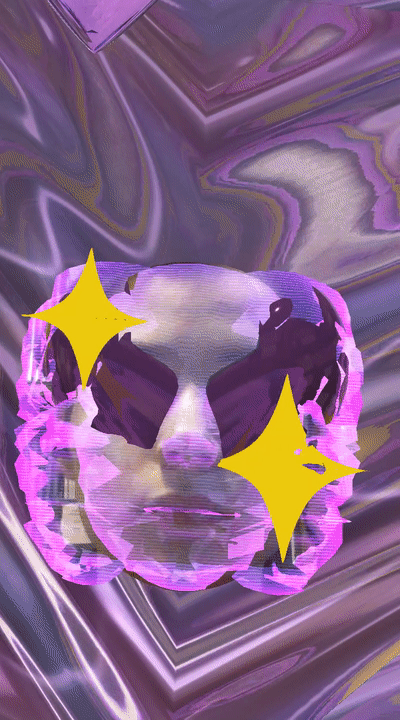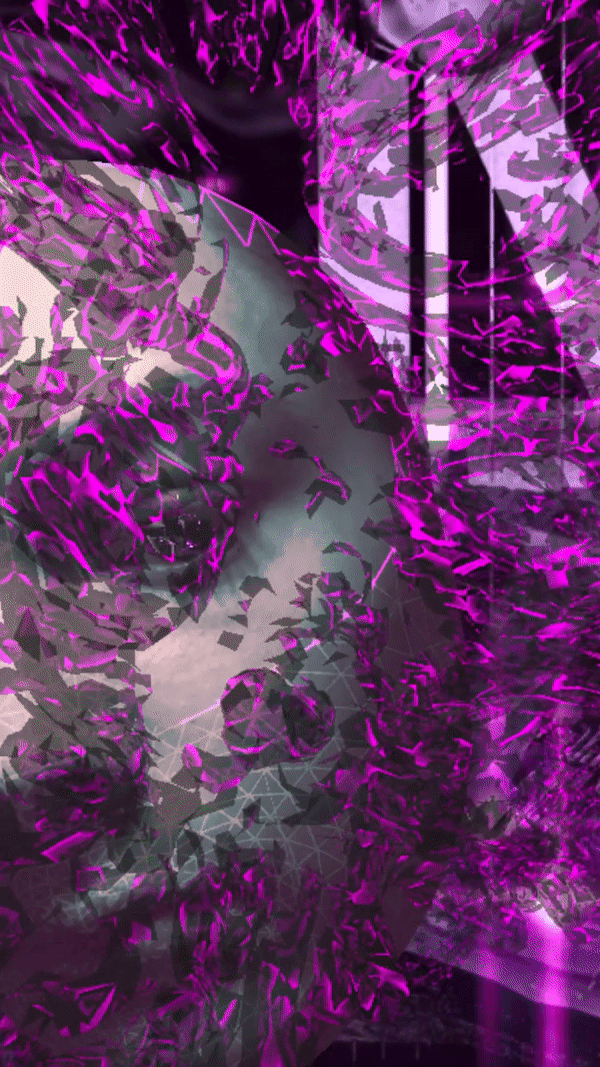Maximum
likelihood
Machine
learning
Minimum
livelihood
Routine
Earning
Facial filters by Medina Bazargali & Anna Engelhardt
Anna Engelhardt
How can one be a cyberwarrior? If your labour depends on public appearance, you will find it hard to remain anonymous. To be a cyberwarrior one needs to be hidden from the policing gaze while simultaneously being viral. Virality now is made accessible!
These facial filters work on Zoom, Skype and all other conventional platforms used for lectures and seminars. To use the filter, install Snap Camera - the app that allows using facial filters on video hostings. After you install it copy the link of the filter by right-clicking “Link” under the GiF >> “Copy Link Location” and paste it to the search bar in Snap Camera. Click on the filter and add it to favourites to use later. To hide your identity, don’t forget to modulate your voice!
Medina Bazargali was born in 2001 in independent Kazakhstan. In their artistic practice Medina finds themselves in the process of exploring ironic and exaggerated political realities where Internet, new algorithmic superstructures and (post)-totalitarian regimes are swirling in a whirlpool of glocalization; where soviet stiffness, digital revolution and the revival of national identity are going together like a 3 in 1 product sold at the supermarket. Through their artworks and research Medina wish to find a sustainable frequency of oscillation between these 3 poles.
Medina Bazargali:
With these instagram filters, I present my view on the Circuits of Truth that are hidden behind the frontend user experience. A hundred years ago, Anna's text would have been a map pointing the free adventurer to critical infrastructures: roads, cities, power plants, factories, and fields. And, of course, military facilities, now troll factories, recruiting to their barracks according to a similar principle and hierarchy. Today, this text functions as a similar map that can be used by cyber-resistance to decolonize social institutions, ensuring the transparency in the functioning of a shared body as one without organs.
If truth is determined by probability, then its universal law is the law of the average. But what if neither side is happy with the middle ground? It would be optimal, of course, to divide them into two or more groups by their interests so that we can get to know them better. If they feel safe and understood inside their bubble, they will be more accommodating. The median voter theorem clearly fails in this case, as long as the infrastructures of truth, which I personally would compare to a self-taught farmer, spray the care of their spectacle into the very corners of human desires. Has neoclassical economics won out in its quest for perfect information about the preferences of economic agents? Modelling a rational homo economicus to describe a "better man", people created a God that learned well from us and predictably used human weaknesses and vices against us.
It was a discovery for me that the forecast and volatility of reputation and attention had been turned into the stock market. The most scarce and, therefore, the most valuable resource for competing with each other machinic infrastructures is the user's time. These infrastructures remind of the transience of our time (more and more often), "objectifying the impression of acceleration of civilizational evolution" (Lubbe, 2019). Indeed, they blur the sense of the present, riveting the user's attention to the world they create, cynically appealing to manipulated cognitive distortions.
Medina Bazargali works as an emerging digital artist/dev at the intersection of decolonization, feminism and folk politics activism. Right now is studying complex systems and philosophy, living and working in Saint-Petersburg, Russia. Medina works with AR face-filters, video, 2D animation, 3D graphics, installation, web-developing, visual coding, cyber-physical systems, computer vision and neural networks.





